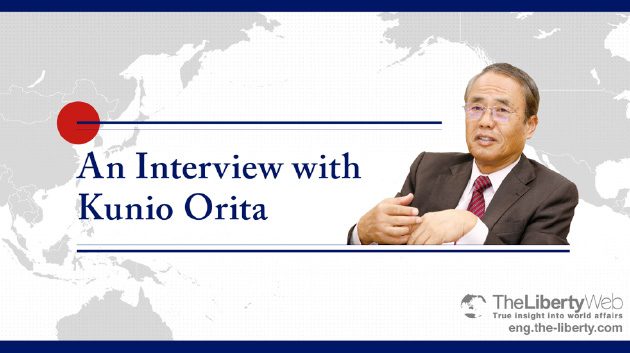Japan Is Going to Lose the U.S. Nuclear Umbrella
An Interview With Kunio Orita
The Liberty Magazine interviewed a former Japanese Self-Defense Force official about the South China Sea crisis and the “Free and Open Indo-Pacific”
Kunio Orita: Having graduated from the National Defense Academy of Japan in 1974, Orita served as Commander of the 6th Air Wing, Commander of the Air Support Command, and served in the Japanese Iraq Reconstruction and Support Group as commanding officer. He is currently visiting professor at Toyo Gakuen University and Chief Director of the Institute for National Strategic Studies in Japan.
China’s national strategy is to annex Taiwan between 2020 and 2025, fully control the South China Sea and oceans surrounding India between 2025 and 2040, and to invade the Senkaku and Okinawa islands between 2040 and 2045.
When President Obama declared that the U.S. was no longer the World Police back in 2013, it really encouraged China. Half a year later China had already started constructions on the Spratly Islands in the South China Sea and have now gained control over the Paracel Islands.
If they invade Scarborough Shoal, which lies near the Philippines, they would completely secure their air and maritime supremacy in the area. They can create a sanctuary free of U.S. fleets, submarines and patrol planes.
Back during the Cold War, the Soviet Union gained control of the Sea of Okhotsk, at the Northeast side of Hokkaido, and the U.S. navy was not able to come close, even by a millimeter.
China is now trying to push the U.S. navy outside of the South China Sea by approaching abnormally close with their naval ships.
Once China controls Scarborough Shoal, it will be “game over” for the U.S. and Japan. We will have no choice but to submit to China.
The Three Merits of the South China Sea
China has three strategic merits for sanctifying the South China Sea.
The most important merit is that once they can control it, they will be free to deploy nuclear submarines into the Pacific Ocean to attack the U.S. mainland. If the U.S. is faced with the risk of nuclear attack, their nuclear umbrella will fall apart and Japan will become defenseless.
Currently, there are U.S. nuclear submarines stationed in the depths of the South China Sea waiting with their tornadoes ready for Chinese submarines to make a move. China is obviously wary of this.
The second merit for China is that they can secure the sea-lane. The South China Sea is a major transportation route: half of all freight ships to and from Japan pass through it, and 90% of oil imports to Japan are carried through.
For China, controlling the South China Sea will give them access to all of this. All they have to do is stop Japanese tanker ships because their “fuel is leaking,” and voila!
The third merit is that they can take control of the huge reserves of natural resources lying beneath the South China Sea.
China Supports Okinawa’s Anti-U.S. Army Movement
China is also targeting Okinawa. According to a report by the U.S.-China Economic and Security Review Commission, China is advancing a scheme to separate the U.S. and Japan through actions in Okinawa.
China sends intelligence agents into Okinawa to gather information, and secret agents to fuel anti-U.S. movements, and also to engage in espionage against U.S. troops. For example, the report suggested that Chinese secret agents had purchased the building where U.S. military servicemen held their living quarters, used the master key to enter their homes and stole confidential information.
China is supporting Okinawa’s anti-U.S. and anti-military movements.
The Free and Open Indo-Pacific
The world has entered an age where we must choose between U.S.-centric values of liberty (Pax Americana) or Chinese-centric oppression (Pax Sinica). The Free and Open Indo-Pacific is a counterstrategy against China’s “One Belt, One Road” initiative, and aims to unite countries that share the values of freedom, democracy and human rights.
Unfortunately, Japan does not have enough power to protect the South China Sea, but the least we can do is to quickly gather enough power to protect our own country. For the U.S., this would also mean protecting the Seventh Fleet stationed in Japan.
China may try to avoid Trump’s pursuit by temporarily dismantling their missiles now positioned in the South China Sea. But we must not be fooled. The U.S. and Japan must reinforce the “Indo-Pacific” strategy to destroy China’s ambitions and their “One Belt, One Road” initiative.



















